Is your child a kindergartener transitioning to Prep? When starting to prep your child for Prep, there’s a lot to think about. But don’t worry, we’re here to help! TalkHQ offer Prep 4 Prep Group Therapy programs!
Many parents worry about this big milestone. We know it can be tough making the jump from kindergarten to Prep. That’s why we offer group therapy sessions to help kids make the transition. Our experienced speech pathologists will help your child feel comfortable and confident in their new school.
Sessions are tailored specifically for kindergarteners, so they can learn about Prep and meet other kids who are also making the jump. This is a great opportunity for your child to get excited about their new school and make friends before classes even start.
This blog will explain what our Prep 4 Prep Group Therapy program, how to sign up and 5 tips you can do to help your child.
What is Prep 4 Prep Group Therapy?
Our Prep 4 Prep group therapy program is designed to help your child get a head start on some of the learning of school. This group helps kids build skills they need for a smoother transition from Kindy into Prep. Our program curriculum includes activities that research shows are required to help with reading and spelling, including oral language, print awareness, phonological awareness, letter-sound links and vocabulary. Below, I explain what these skills are and why they are important for Prep.
Oral Language
Starting Prep, it is essential that children have a strong foundation in oral language. This is because oral language is the foundation upon which all reading and spelling skills are built. Children who have strong oral language skills are more likely to be successful readers and spellers. They are able to understand what they hear and see, and they are able to communicate their own ideas clearly. As a result, they are better equipped to learn the skills necessary to read and spell. For these reasons, it is clear that oral language is essential for starting Prep and for learning to read and spell.
Print Awareness
Print awareness is crucial for starting Prep and for learning to read and spell. It helps children to understand that print has meaning and that books are read from left to right, top to bottom. It also helps them to understand that sentences are made up of words and words are made up of letters, which is essential for learning to read and spell. Print awareness activities include identifying the title, the author, and which way to orient a book.
Phonological Awareness
Starting Prep is an exciting time for children as they transition from play-based learning to more formal academics. An important part of this transition is developing phonological awareness – the ability to hear, identify and manipulate the individual sounds in words. For example, a phonological awareness activity is blending and segmenting words like cat = “c-a-t”. This skill set forms the foundation for learning to read and spell, and research has shown that children who develop phonological awareness are more likely to become successful readers and spellers. For parents, you can do several things to help your child develop phonological awareness. Talking about the sounds in their name, making up silly rhymes, sounding out words, and reading Dr Seuss’ “ABC” book are great ways to build their phonological awareness.
Letter-sound links
When they begin Prep, they start from scratch regarding their literacy skills. It is essential that they understand the importance of letter-sound links. Letter-sound links provide a foundation for learning to read and spell. By understanding how letters and sounds correspond with one another, students can begin to build up their literacy skills; this is the letter A, representing the “ah” sound. Letter-sound links help students to remember words more easily. When they can see the link between the word and the letters that make it up, they are more likely to remember how to spell it correctly. For all these reasons, letter-sound links are essential for starting Prep students. If they can grasp this concept early on, it will stand them in good stead for the rest of their schooling journey.
Vocabulary
Exposing your child to a bigger vocabulary helps expand their ever-growing brain and really helps them when they are starting school. A large part of starting school is understanding and following directions. This is where vocabulary comes into play. If your child has a limited vocabulary, they will likely have difficulty understanding what their teacher is saying. This can lead to frustration and a feeling of not being ‘smart enough’. Furthermore, a child with a limited vocabulary will also have difficulty reading and spelling words correctly. This can be extremely frustrating for a child who wants to do well in school but struggles with literacy. On the other hand, a child with a strong vocabulary will be better equipped to understand their teacher and comprehend what they are reading. As you can see, vocabulary is an important part of reading comprehension and spelling.
What’s involved in the Prep 4 Prep groups?
Each of our groups runs for 1 hour each day for 4 days. It is important that your child attends each day of the groups. Groups run for 4 days.
How do children learn to read and spell?
Learning to read and spell actually starts before Prep. Children are starting to learn about books, print, letters, letter sounds, and how to write letters in kindergarten. Reading and spelling are written communication skills that are learned. Talking and listening skills are typical developing skills in kids. Typically. they need good oral language skills BEFORE they can learn written communication. Read more about how kids learn to read here.
Do parents sit in the sessions as well?
Parents will wait in the reception. At the 50-minute mark, the speech pathologist will bring the children out to the parents and explain what was covered in the group. Because of confidentiality, specific feedback about your child’s performances is shared via the See Saw app. This is a REALLY important feature of the groups. A big component of speech pathology is coaching parents (and kids) on how to use particular techniques to help build and strengthen specific skills. These ten-minute daily tricks/tips in the family home make a world of difference to your child’s reading and spelling.
How many children are in each group?
We only allow 3-4 children per group to maximise learning.
How do I enrol in Prep 4 Prep?
Contact Us here, and our support services team will be in touch to add your child to the group. Alternatively, click this link and you will be taken to our online booking system. and you can select the location and time that suits you. For private paying clients, we require a deposit of $96. Once enrolled in the group, we will send you a confirmation email, case history and payment details.
What if the groups are already full?
You can register your expression of interest. We will contact you when the next round of groups becomes available. To ensure your child’s place, we recommend paying a deposit.
How much does group therapy cost?
Each session costs $96. This includes a $10 non-refundable administration fee.
How much is the deposit?
The deposit is $96, payable at the time of booking. NDIA-funded clients will need to submit a completed service agreement to secure their child’s place.
What if my child can’t attend the group?
We understand that life happens and plans can suddenly change. You must contact us to let us know you cannot attend. Your child can attend a group at a later date.
If you are no longer interested in attending the groups, you will receive a refund of $86.
Other tips to get your child prepped for Prep
You can also do other things to help your child prepare for Prep. Here I share my top 5 tips:
1. Make sure your child is getting enough sleep
It’s hard to believe that starting Prep is just around the corner. Suddenly, your child will be immersed in a world of learning, and it’s important to ensure they’re getting enough sleep. A good night’s sleep helps children to focus at school and sets them up for a lifetime of healthy habits. Unfortunately, many kids don’t get enough sleep, and this can lead to problems with behaviour, concentration and learning. You can take a few simple steps to help your child get a good night’s sleep. Establishing a bedtime routine is a great way to wind down before sleep, and making sure there’s no screen time for an hour before bed will help too. With a little bit of planning, you can help your child get the sleep they need to thrive at school and beyond.
2. Read to them every day
One of the best ways to help your child adjust to starting Prep is reading to them daily. Reading not only helps to develop their language skills but also encourages them to be inquisitive and imaginative. It can be a fun and bonding activity that you can enjoy together. It also encourages a love of reading, which will help them throughout their academic career. Make reading time a special part of your day, and watch your child’s love of learning grow. What’s more, reading before bed can help to calm and relax your child, making it easier for them to drift off to sleep. So make sure you carve out some time each day to share a story with your little one – it will make all the difference to their starting Prep experience.
3. Help them learn to describe things
When starting Prep, many children are still learning how to describe things. This can be frustrating for them, as they are not always able to communicate what they want or need. However, you can do a few things to help them learn to describe things more effectively. First, provide them with concrete examples. For instance, if you ask them to describe a toy, show them a picture of the toy and point out its key features. Second, encourage them to use specific and descriptive language. Help them to brainstorm a list of adjectives that they can use to describe the object. Finally, give them plenty of opportunities to practice describing things. Ask them to describe what they did today, what they had for lunch, or what they can see outside the window. With a little bit of help, your child will soon be an expert at describing things!
4. Encourage them to build their independence by giving them chores
As any parent knows, starting Prep can be a big adjustment for kids. They suddenly have to learn to do things for themselves, from tying their shoelaces to remembering to put their homework in their school bag. Giving them chores to do around the house builds their independence. Even simple tasks like setting the table or emptying the plastic cups from the dishwasher can help them to feel more confident and independent. You can give them more responsibility as they get older, such as taking out the rubbish or feeding the family pet. Not only will this help to lighten your load, but it will also give them a sense of accomplishment and pride. So next time you’re feeling overwhelmed, why not ask your kids to lend a hand? You might be surprised at how much they’re capable of.
5. Show them it is OK to make mistakes
Making mistakes is part of life. We all do it, no matter how hard we try to avoid it. But starting Prep (or kindergarten) is a big deal for kids. They’re learning so much new stuff, and they want to do everything perfectly. So when they make a mistake, it can feel like the end of the world. That’s why it’s so important for parents and teachers to show kids that making mistakes is OK. It’s all part of the learning process. If we never made any mistakes, we would never learn anything new. So next time your child makes a mistake, help them to see it as a positive learning experience. It’s a chance to grow and become even smarter and more capable than they were before.
Following these tips can help your child feel confident and prepared for starting Prep.







